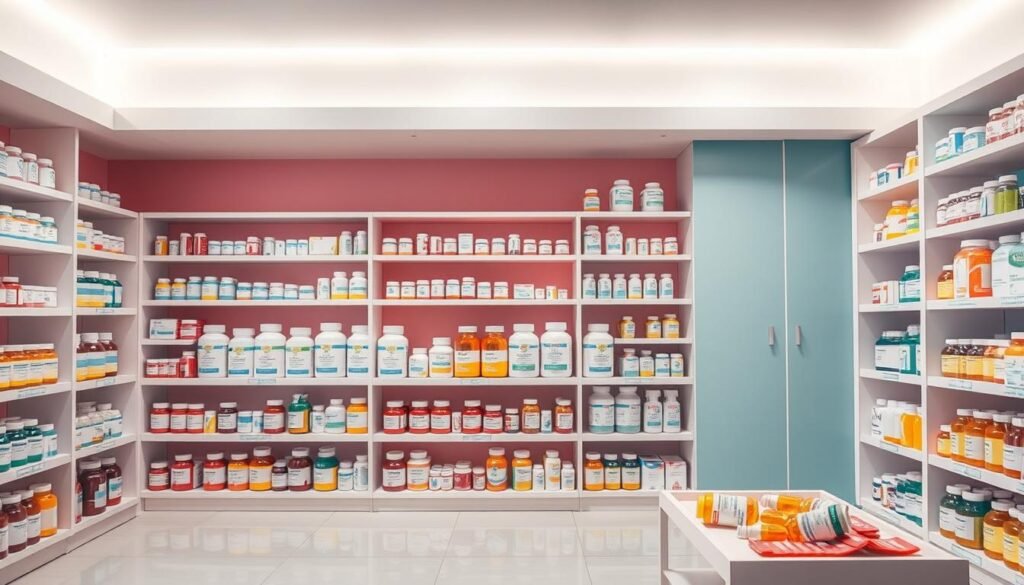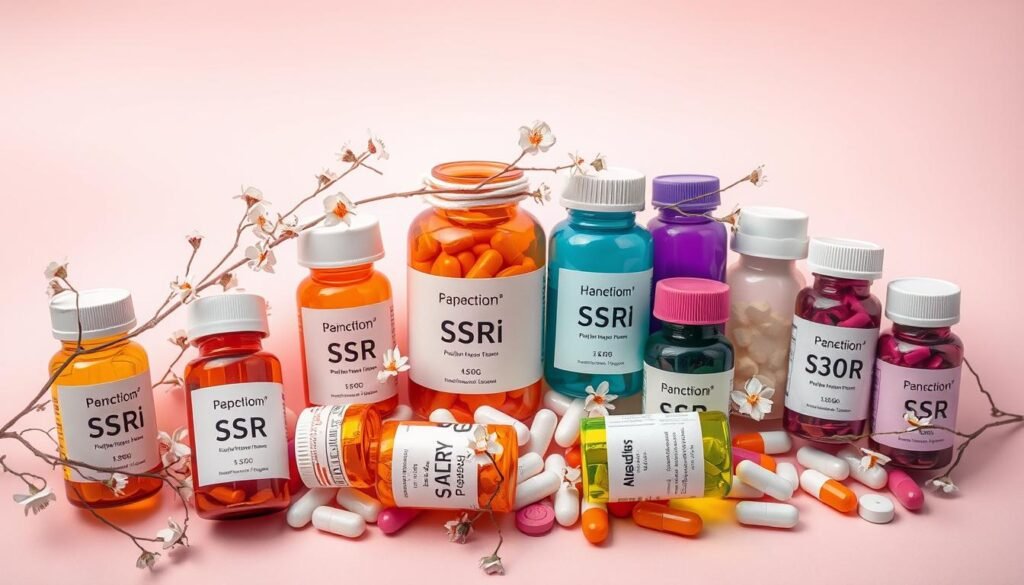About 70% of patients see relief from depression with medication, which greatly reduces their symptoms. In the U.S., mental health issues touch 51.5 million adults. Finding the best medication for depression and anxiety is key but tough. The options, including antidepressants and anti-anxiety medications, are many and vital for management.
But, picking the right treatment needs informed choices, as success isn’t instant. Some meds need 6 weeks or more to work. Thus, patience and talking often with healthcare providers are important. This article explores mental health drugs, their impact, and how to choose the right plan for good mental health.
Key Takeaways
- Choosing the right medication for depression and anxiety is critical for effective treatment.
- Antidepressants can significantly reduce symptoms but may require time to be effective.
- Close collaboration with healthcare providers is essential for an optimal treatment plan.
- Combining medication with psychotherapy can enhance treatment outcomes.
- Awareness of potential side effects and risks associated with medications is important.
- Up to 70% of patients may benefit from medications like SSRIs as first-line treatments.
Understanding Depression and Anxiety
Depression and anxiety are serious mental health issues that affect many people in the U.S. They can change the way a person feels, acts, and interacts with others. This can also affect their work and how they function every day.
Defining Depression
Depression is a mood disorder. It makes people feel very sad and lose interest in life. About 7.1% of U.S. adults face depression each year. It’s more common in women than in men. The LGBTQI+ community sees even higher rates of depression due to specific challenges.
Defining Anxiety
Anxiety is about feeling too worried or scared. It also includes physical signs like a fast heartbeat. Anyone can get anxiety, but it looks different for each person. Often, anxiety and mood disorders go hand in hand, making mental health more complicated.
The Connection Between the Two
Mood disorders and anxiety disorders are closely linked. Research shows that 30% of people with major depression also deal with anxiety. This shows how complex mental health issues are. Understanding how they relate is key for proper treatment.
| Condition | Characteristic | Prevalence |
|---|---|---|
| Depression | Mood disorder with feelings of sadness and hopelessness | 7.1% of U.S. adults |
| Anxiety Disorder | Common condition with excessive worry and fear | Varies significantly among populations |
| Overlap | Individuals with one often experience the other | 30% co-occurrence in major depression cases |
Common Symptoms of Depression and Anxiety
Understanding the common symptoms of depression and anxiety is crucial. These conditions can deeply impact emotional and physical health. They lead to problems in daily life. Recognizing these symptoms early helps get timely help and effective treatment.
Emotional Symptoms
Emotional symptoms significantly impact mental health. People may feel persistently sad or irritable. They might feel worthless or guilty. Anxiety or restlessness could rise.
- Persistent sadness or low mood
- Irritability
- Feelings of worthlessness or guilt
- Heightened anxiety or restlessness
These can upset daily life and lower quality of life. They can start a cycle of distress that’s hard to escape.
Physical Symptoms
Emotional turmoil often manifests physically. Some common symptoms are:
- Fatigue or lack of energy
- Sleep disturbances, such as insomnia or hypersomnia
- Changes in appetite or weight
- Gastrointestinal issues
- Pain without a clear physical cause
These aren’t just side effects; they worsen mental health and emotional states.
Long-term Effects on Daily Life
The impacts of depression and anxiety symptoms are far-reaching. They can disturb:
- Personal relationships
- Job performance
- Social interactions
Engaging in enjoyable activities becomes hard. The negative consequences often fuel depression and anxiety more. Knowing these effects is the first step towards recovery.

| Type of Symptom | Examples |
|---|---|
| Emotional | Sadness, irritability, feelings of worthlessness |
| Physical | Fatigue, sleep disturbances, changes in appetite |
| Long-term Effects | Disrupted relationships, job performance issues |
Types of Medications Available
It’s key to understand the various medications used for depression and anxiety to make effective treatment plans. Each type works differently to ease symptoms. The main classes of medication in this field are listed below.
Antidepressants
Antidepressants are widely used to treat mood disorders. This category includes different types:
- Selective Serotonin Reuptake Inhibitors (SSRIs): These help by increasing serotonin, which improves mood and emotional health. For instance, Zoloft (sertraline) and Lexapro (escitalopram) are effective and typically have fewer side effects.
- Serotonin-Norepinephrine Reuptake Inhibitors (SNRIs): Drugs like Effexor (venlafaxine) and Cymbalta (duloxetine) raise serotonin and norepinephrine. They help with mood and anxiety symptoms.
- Tricyclic Antidepressants (TCAs): Amitriptyline and nortriptyline focus on serotonin and norepinephrine but often have more side effects than SSRIs.
- Monoamine Oxidase Inhibitors (MAOIs): For tough cases, medications like Nardil (phenelzine) can help, but you have to watch your diet because of possible interactions.
Anti-Anxiety Medications
Anti-anxiety medications target anxiety symptoms directly:
- Benzodiazepines: Drugs such as Xanax (alprazolam) and Ativan (lorazepam) work quickly for acute anxiety. They are mainly for short-term use because of addiction risks.
- Atypical Antidepressants: These medications, like Wellbutrin (bupropion), work differently and can be a good choice if traditional antidepressants don’t work or cause side effects.
Combination Therapies
Sometimes, doctors suggest combination therapies for better results. This method uses various medications to more effectively target depression and anxiety. For instance, mixing an SSRI with a benzodiazepine can stabilize mood and quickly relieve anxiety.

Medication for Depression and Anxiety
Finding the right medication for depression and anxiety can be challenging. There are many psychiatric medications available. Understanding them can help in finding the most effective treatment.
Selective Serotonin Reuptake Inhibitors (SSRIs)
SSRIs are often used first for treating depression. They increase serotonin in the brain, which improves mood and lessens anxiety. Well-known SSRIs include fluoxetine (Prozac) and sertraline (Zoloft).
These medications usually have milder side effects and are safer in high doses. This makes them a top choice for doctors.
Serotonin-Norepinephrine Reuptake Inhibitors (SNRIs)
SNRIs work on serotonin and norepinephrine in the brain. Medications like venlafaxine (Effexor XR) and duloxetine (Cymbalta) fall into this category. They are effective for both depression and anxiety.
Some studies suggest SNRIs might have extra benefits over SSRIs. However, these findings are not definitive and can vary between people.
Tricyclic Antidepressants (TCAs)
TCAs, such as amitriptyline, are not as commonly used now. They come with more risks of side effects and overdose. Doctors usually consider TCAs when SSRIs or SNRIs haven’t worked.
Benzodiazepines as Emergency Relief
Benzodiazepines like lorazepam (Ativan) and diazepam (Valium) provide quick relief for acute anxiety. They are effective but meant for short-term use only. This is because they can lead to dependence and affect memory.

How to Choose the Right Medication
Choosing the right medication for mental health, like depression or anxiety, involves many steps. It’s important to know your medical history, talk with healthcare providers, and understand the side effects. Each step is crucial for the medication’s success and your safety.
Consultation with Healthcare Provider
Talking openly with a healthcare provider is key when picking a medication. This talk lets the provider assess your symptoms, consider any other conditions, and suggest the best medication options. It also lets you share your worries and preferences, making the treatment a team effort.
Personal Medical History Considerations
Knowing your full medical history is essential when choosing a medication. It helps healthcare providers spot possible issues with other medicines you’re taking. They consider your past reactions to drugs, family drug history, and current health issues to pick the most suitable treatment.
Potential Side Effects
Knowing the possible side effects of medications is critical in making a choice. Common side effects include:
- Digestive issues
- Fatigue
- Weight changes
Understanding these side effects helps you weigh the pros and cons of each medication during the treatment process.
| Medication Type | Common Side Effects | Considerations |
|---|---|---|
| SSRIs | Nausea, insomnia, headache, sexual dysfunction | Usually take 2–4 weeks to reach full effect |
| SNRIs | Headache, dizziness, sweating | Effective for both anxiety and depression |
| Tricyclic Antidepressants | Dry mouth, constipation, blurred vision | Higher risk of overdose |
| Benzodiazepines | Drowsiness, dizziness, confusion | Used for short-term relief of severe symptoms |
Monitoring Your Medication Effectiveness
To make sure your depression and anxiety meds work well, keep in touch with your doctors. Understand when you should start feeling better. Also, keep track of side effects and make sure you keep your doctor visits.
Timeline for Improvement
It usually takes 4−8 weeks for meds to work. Stay hopeful and patient during this time. Your doctor will help you through it. They might change your meds if needed to get the best results.
Assessing Side Effects
Monitoring side effects is key. SSRIs might cause stomach aches, headaches, or other issues. Talk to your doctor if these bother you. They’ll help manage them. It’s important to catch serious issues early, like serotonin syndrome, when you’re on different meds.
Importance of Follow-up Appointments
Seeing your doctor regularly is important. These visits help check if your meds are working right. They let you talk about your concerns. This supportive setting helps tailor care to what you need.
| Medication Type | Time to Effect | Common Side Effects | Monitoring Needs |
|---|---|---|---|
| SSRIs | 4−8 weeks | Upset stomach, headache, sexual dysfunction | Regular follow-up assessments |
| Tricyclics | 4−8 weeks | Severe side effects, including weight gain | Cardiovascular monitoring |
| Benzodiazepines | Immediate | Dependence, withdrawal symptoms | Monitor dosage and duration |
| Atypical Antipsychotics | Up to 6 weeks | Weight gain, metabolic syndrome | Weight and glucose monitoring |
Combining Medication with Therapy
Mixing medication with therapy gives a full plan for treating mental health issues like depression and anxiety. Many therapy types work better with medication. This improves how well treatments work and makes life better.
Types of Therapy That Work Well with Medications
Cognitive Behavioral Therapy (CBT) and more can do a lot when used with medication. These therapies tackle the main issues of mental conditions. They also give tools to handle symptoms. This support is great for those dealing with anxiety and depression.
Benefits of Psychotherapy
Psychotherapy does more than ease symptoms; it helps build coping skills and emotional understanding. People in therapy with medication see a 50% jump in coping skills. This mix boosts treatment success by 30%, offering hope to many.
Support Groups and Community Resources
Groups and community help are key for people with similar struggles. They create a sense of community, improving therapy results. Studies find a 40-50% drop in relapse for those using therapy and medication. This shows why it’s good to combine treatments, especially for anxiety issues.
| Type of Treatment | Effectiveness | Additional Benefits |
|---|---|---|
| Medication Alone | 60-70% insufficient response | Basic symptom management |
| Therapy Alone | 30-50% effective | Develop coping strategies |
| Combination of Therapy and Medication | Up to 75% better long-term outcomes | Enhanced quality of life, lower relapse rates |
Alternative Treatments for Depression and Anxiety
The way we deal with depression and anxiety has changed. Many people now use alternative treatments along with usual medicines. These methods can support existing treatments. They help improve mental health by offering new ways to boost well-being.
Cognitive Behavioral Therapy (CBT)
CBT is a key player in alternative treatments. It’s a method based on evidence that targets and changes negative thoughts and actions. These negatives are often linked to depression and anxiety. Many find CBT helps them handle stress better and develop healthy reactions to tough situations.
Mindfulness and Meditation
Mindfulness and meditation are now very popular for their focus on the present. By practicing these regularly, people can relax more. This relaxation can ease some symptoms of depression and anxiety. Studies show these practices help people become more emotionally stable over time.
Lifestyle Changes and Holistic Approaches
Changing your lifestyle can greatly benefit your mental health. Exercise is known to lessen stress and help with depression. Eating well and getting enough sleep are also crucial for mental health. More people are trying holistic methods like herbal supplements and acupuncture. But, it’s important to be careful with these. They can sometimes affect your regular medications.
| Alternative Treatment | Effectiveness | Considerations |
|---|---|---|
| CBT | High – Evidence-based | Requires a trained therapist |
| Mindfulness and Meditation | Moderate – Positive effects | Availability of resources varies |
| Lifestyle Changes | High – Improves overall health | Requires consistency and commitment |
| Herbal Supplements | Variable – Mixed research findings | Consult healthcare provider first |
Conclusion
Finding the right treatment for depression and anxiety can be hard. Yet, there is hope with many options available. Working together with doctors and therapists helps a lot in managing mental health.
Mental health matters for about 17.2% of people every year. Anxiety and depression often go hand in hand. It’s very important to understand the treatments we have. Medicines like SSRIs and benzodiazepines can really help when used with therapy. This way, you can fight the big impact these illnesses have on lives and money.
Staying positive and active in your treatment is key. Mixing medicine, therapy, and lifestyle changes can lead to better mental health. With support and the right information, overcoming mental health challenges is possible.